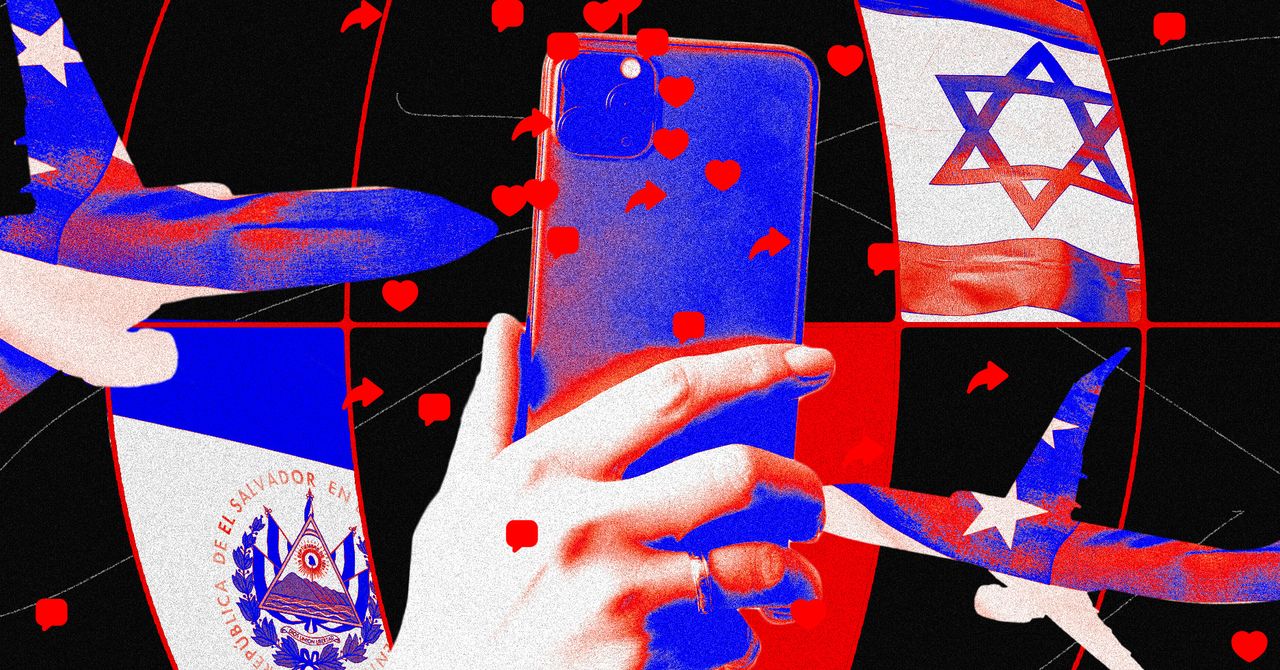These trips have seemingly influenced the way traditional politicians spread diplomatic messages on their own social media accounts. When the Trump administration first partnered with the Nayib Bukele government this spring to send migrants detained in the US to the El Salvadoran megaprison Terrorism Confinement Center (CECOT), government officials traveled to the prison, and images of the visits were blasted online. Department of Homeland Security secretary Kristi Noem stood in front of dozens of CECOT’s prisoners who were lined up behind the prison’s bars where she took photos and videos warning immigrants that this prison could be “one of the consequences” they face if they’re caught unlawfully entering the US.
The strategy hasn’t been confined to explicitly political influencers either. In July, Israel prime minister Benjamin Netanyahu joined popular YouTuber group the Nelk Boys for their Full Send Podcast. The more than an hourlong podcast provided Netanyahu with a new audience composed primarily of young men who rarely tune into traditional news, allowing the world leader to reach a coveted demographic credited with helping Trump win reelection in 2024. Netanyahu’s team reached out to Full Send to schedule the interview, John Shahidi, who manages the Nelk brand, tells WIRED.
“We are so not qualified to do this,” Kyle Forgeard said at the beginning of the podcast, shortly before Netanyahu joined. “That’s what’s interesting about this.”
The podcast also showed how these kinds of political collaborations could blow up in the creators’ faces. Clips of Nelk’s interview with Netanyahu drew fierce criticism from both the right and left online, with critics accusing the Full Send crew of trivializing Israel’s war on Gaza and extending Netanyahu a platform to spread propaganda.
“Asking him if he prefers Burger King or McDonald’s … while people are starving … this is insane,” one YouTube commenter wrote. (After going on the Israel365 trip and getting some similar blowback, Zirkle “parted ways” with Bannon’s War Room, Axios reported.)
For foreign governments seeking approval from the MAGA base, meeting with these creators provides them with insight on US voters and a platform to speak directly to them.
“If you want to understand MAGA, you have to understand the online ecosystem that fuels our movement. That’s why it’s no surprise countries around the world are eager to engage with creators who have the ear of the administration and finger on the pulse,” says CJ Pearson, a MAGA-aligned creator.
Conducting diplomacy via influencer may in some cases have the additional advantage of falling into blind spots in social media regulation and existing laws governing lobbying, allowing creators to operate on behalf of foreign governments without traditional disclosures.
“Part of the challenge with political influencers is that it’s unclear the extent to which they’re being paid by various competing interest groups and organizations,” says Samuel Woolley, an associate professor at the University of Pittsburgh who studies digital propaganda. “Political influencers exist in this liminal space where they’re one part campaign mouthpiece and another part independent actor.”
This points to what’s new—not trips and conferences for potentially sympathetic and influential people but rather using them to establish a new type of diplomatic messenger. Partisan influencers with millions of followers can amplify foreign policy talking points on behalf of the MAGA movement and any foreign governments eager to access their platforms—all beyond existing rules and oversight.
“It makes them very valuable,” says Woolley, “given discrepancies and extant holes in the law to political organizations that are hoping to do things a little more under the table and in a little bit more of a casual or less trackable manner.”




Comment ×